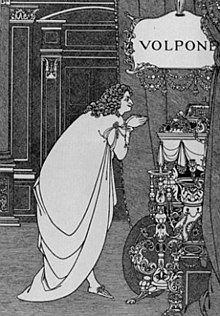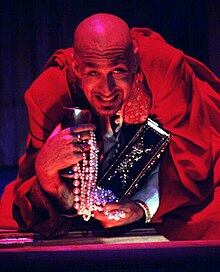Volpone (Stefan Zweig)

Volpone is a comedy by Stefan Zweig based on motifs by Ben Jonson .
Edited by Stefan Zweig
Stefan Zweig published a completely free rework of the classic in 1926. He largely adopted the characters of the Commedia dell'arte , but formulated them freely and in a comparatively modern manner of expression. He changed both the original story and the characters in large parts and wrote a new ending in which Volpone loses his fortune to Mosca. Three acts, 13 roles (two of them female, eleven male), playing time approx. 160 minutes. Location: Venice. Time: Renaissance.
Table of contents
The rich merchant Volpone ('fox') is dying. At least that is what the greedy Venetians Corbaccio ('evil crow'), Corvino ('raven') and Voltore ('vulture') believe, who buzz around the terminally ill and shower them with gifts to be used as heirs of his fortune. In reality, however, Volpone is perky, he just wants to enrich himself extensively with the legacy sneaks and then move to Smyrna with his family . An agile young helper and parasite named Mosca ('fly') supports him in this game.
Mosca cleverly plays the legacy sneaks off against each other and incites them to outdo each other in their favors for the supposedly dying person. He persuades the miser Corbaccio to disinherit his son, and he even persuades the jealous trader Corvino to offer Volpone his wife Colomba ('dove') to look after the 'poor sick man' as a sign of friendship . Corvino hopes that Volpone could hit the blow with the excitement. Colomba, who has no idea of this, is so appalled by Volpone's sudden recovery and above all his stormy advances that she loudly calls for help. Volpone is then arrested by three sbirren (guards) and brought before the court of the Republic of Venice . Prosecutor is Leone ('lion'), the son of Corbaccio who has lost his inheritance, who heard Colombo's cries for help from the next room and who sees through Volpone's evil game. The hot-headed Leone, however, cannot stand up to court against the skillful maneuvers and lies of the legacy sneaks, who all have an interest in ensuring that their future benefactor does not end up in prison without having appointed an heir. Leone loses the trial and has a fit of anger, which even leads to the judge putting him in the pillory in the piazza.
After the trial, everyone pushes for the will that was exclusively promised to them, and Volpone has no choice but to draw up several wills and appoint each one individually as the 'sole heir'. He then regrets that he could not see the greedy Venetians fight for the inheritance and so decides to fake his death in order to enjoy the spectacle. Mosca, however, no longer wants to participate in this new fraud and finally only agrees on the condition that he too receives a will that identifies him as the sole heir.
Mosca sends a message that Volpone has died. Immediately the gallows birds flutter over and begin to fight over the inheritance. The summoned judge condemns Volpone as a fraud and announces that the body of Volpone, who is still very much alive and hiding trembling behind the bed curtain, is to be hung in a public place. Then Mosca steps forward, shows his will and generously proclaims that as the sole heir he wants to give the inheritance stealers all their gifts and more, if they only want to spare Volpone's corpse. The betrayed consent, and Volpone must be happy to take home at least the bare life of Venice.
"You wanted to make a fool of the others and became it yourself"
Secondary literature
- Jonas A. Barish: The double plot in Ben Jonson's “Volpone” . In: Willi Erzgräber (Ed.): Interpretations Volume 7 · English literature from Thomas More to Laurence Sterne . Fischer Verlag, Frankfurt a. M. et al. 1970, pp. 96-111.
- Giorgia Sogos: L'evoluzione del conflitto nel Volpone di Stefan Zweig. In: Giorgia Sogos: Stefan Zweig, the cosmopolitan. Study collection on his works and other contributions. A critical analysis. Free Pen Verlag, Bonn 2017, pp. 11–32. ISBN 978-3-945177-43-3 .
Film adaptations
- 1941 by Maurice Tourneur with Harry Baur (Volpone), Louis Jouvet (Mosca), Jacqueline Delubac (Colomba)
- 1967 as "The Honey Pot" by Joseph L. Mankiewicz , with Rex Harrison (Fox), Cliff Robertson (McFly), Maggie Smith (Sarah)
- 1974 by György Fehér (TV) with Tamás Major (Volpone), Lajos Básti (Mosca), Ildikó Bánsági (Colomba)
- 1978 by Pierre Sabbagh (TV) with Jean Le Poulain (Volpone), Francis Huster (Mosca), Claude Jade (Colomba)
- 1978 by Annelies Thomas (TV) with Rolf Hoppe (Volpone), Hanns-Jörn Weber (Mosca), Jadranka Matkovic (Colomba)
- 2003 by Frédéric Auburtin (TV) with Gérard Depardieu (Volpone), Daniel Prévost (Mosca), Inés Sastre (Colomba)
Radio plays
- 1952: Volpone or the fox. Producer: NWDR . Editing (word): Ernst Drolinvaux . Director: Kurt Ehrhardt .
- Speaker among others
- Erich Ponto , Hannes Messemer , Otto Burger and Inge Meysel .
- 1957: Volpone. Producer: BR . Editing (word): Stefan Zweig , Eberhard Freudenberg and Carl Conrad . Director: Helmut Brennicke .
- Speaker among others
- Heinz Moog , Heinz Drache , Gertrud Kückelmann , Werner Hessenland , and Fritz Rasp .
- 1972: Volpone or The Fox. Producer: Broadcasting of the GDR . Editing (word) and dramaturgy: Peter Goslicki . Director: Werner Grunow
- Speaker among others
- Kurt Böwe , Klaus Piontek , Monica Bielenstein , Heinz Hinze and Herwart Grosse .
Web links
- Ben Jonson: Volpone or The Fox . Original English text on Project Gutenberg .
- Ben Jonson's ›Volpone‹ - a loveless comedy in three acts. . German translation by Stefan Zweig on Projekt Gutenberg-DE .
